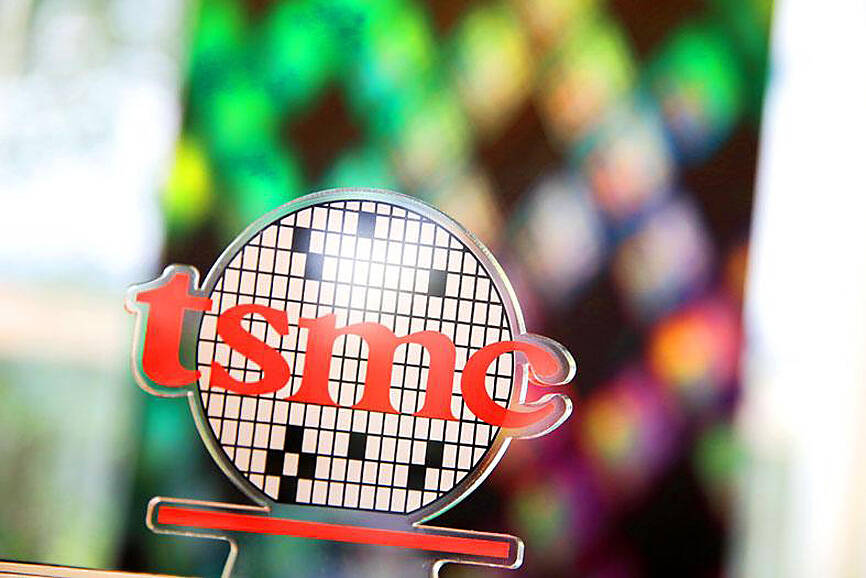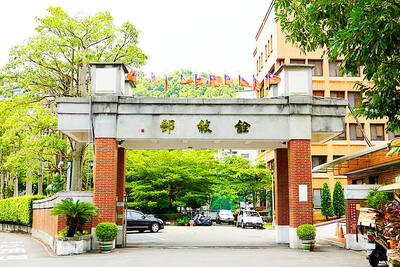Taiwan Semiconductor Manufacturing Co (TSMC, 台積電) is in discussions with the White House over potential US tariffs on semiconductors, seeking a solution that benefits both sides, a senior company executive said on Friday.
Speaking at a forum hosted by the US think tank Hudson Institute in Washington, TSMC senior vice president Peter Cleveland said that the company was maintaining close communication with US President Donald Trump’s administration and is optimistic that talks were moving in a “positive direction.”
Talks were ongoing, particularly concerning Taiwan’s extensive semiconductor manufacturing ecosystem and its exports to the US, he said.

Photo: I-hwa Cheng, Bloomberg
“And they’re listening,” he added.
However, TSMC was still uncertain about what will happen on Wednesday, when Trump is expected to introduce a slew of new tariffs.
To avoid the tariffs and appease Trump, who is eager to shift manufacturing to the US, TSMC has already made substantial investments in the country. The company on March 3 committed an additional US$100 billion to build three wafer fabrication plants, two advanced integrated circuit packaging facilities, and a research and development center, bringing its total investments in Arizona to US$165 billion.
At the forum, titled “Building a Sustainable and Successful Semiconductor Ecosystem under the Trump Administration,” other industry leaders also weighed in on the potential effect of the proposed tariffs.
Jonathan Hoganson, head of US government affairs at semiconductor equipment supplier ASML Holding NV, said that industry players hope the new policy will strengthen the ecosystem rather than create barriers.
Patrick Wilson, vice president of government relations at Hsinchu City-based smartphone IC designer MediaTek Inc (聯發科), underscored the importance of fostering a favorable business environment.
“We just want to have the right tariff or regulatory environment that makes it possible for our customers to win,” he said.
TSMC is seeking to start construction of its third advanced wafer fab in Arizona soon, Cleveland said.
“We have not started to break ground on our third wafer fab in Phoenix. We would like to start next week,” he said.
To begin construction, the company needs assistance from the US government, such as an environmental permit, he said.
While Taiwan remains the “home” of the contract chipmaker, the US was an “ideal location” for TSMC to extend its global footprint, Cleveland said.
TSMC aims to roll out high-end chips from plants in Arizona, and “we’re going to build those in Phoenix to sustain the US’ AI [artificial intelligence] leadership,” he said.
The first fab in Arizona has started production using the 4-nanometer process, while the second fab, which would use the 3-nanometer, 2-nanometer and A16 processes, is under construction and is expected to begin production in 2028.
The third, of which TSMC has said little to date, is expected to begin production by 2030, using the 2-nanometer or more advanced processes, the company said in April last year.
However, production in the US has not been easy, Cleveland said.
“The United States is a different marketplace. Labor costs are high,” he said.
Nevertheless, he highlighted TSMC’s “excellent” partnership with Washington, saying the company had a “good dialogue” with the US Department of Commerce about structural issues.
“We are optimistic about our collaboration and partnership going forward with the Trump administration as well as Capitol Hill,” he said.

Taiwan Semiconductor Manufacturing Co (TSMC, 台積電) is expected to start construction of its 1.4-nanometer chip manufacturing facilities at the Central Taiwan Science Park (CTSP, 中部科學園區) as early as October, the Chinese-language Liberty Times (the Taipei Times’ sister newspaper) reported yesterday, citing the park administration. TSMC acquired land for the second phase of the park’s expansion in Taichung in June. Large cement, construction and facility engineering companies in central Taiwan have reportedly been receiving bids for TSMC-related projects, the report said. Supply-chain firms estimated that the business opportunities for engineering, equipment and materials supply, and back-end packaging and testing could reach as high as

CHAMPIONS: President Lai congratulated the players’ outstanding performance, cheering them for marking a new milestone in the nation’s baseball history Taiwan on Sunday won their first Little League Baseball World Series (LLBWS) title in 29 years, as Taipei’s Dong Yuan Elementary School defeated a team from Las Vegas 7-0 in the championship game in South Williamsport, Pennsylvania. It was Taiwan’s first championship in the annual tournament since 1996, ending a nearly three-decade drought. “It has been a very long time ... and we finally made it,” Taiwan manager Lai Min-nan (賴敏男) said after the game. Lai said he last managed a Dong Yuan team in at the South Williamsport in 2015, when they were eliminated after four games. “There is

Democratic nations should refrain from attending China’s upcoming large-scale military parade, which Beijing could use to sow discord among democracies, Mainland Affairs Council Deputy Minister Shen You-chung (沈有忠) said. China is scheduled to stage the parade on Wednesday next week to mark the 80th anniversary of Japan’s surrender in World War II. The event is expected to mobilize tens of thousands of participants and prominently showcase China’s military hardware. Speaking at a symposium in Taichung on Thursday, Shen said that Chinese Minister of Foreign Affairs Wang Yi (王毅) recently met with Indian Prime Minister Narendra Modi during a visit to New Delhi.

FINANCES: The KMT plan to halt pension cuts could bankrupt the pension fund years earlier, undermining intergenerational fairness, a Ministry of Civil Service report said The Chinese Nationalist Party (KMT) caucus’ proposal to amend the law to halt pension cuts for civil servants, teachers and military personnel could accelerate the depletion of the Public Service Pension Fund by four to five years, a Ministry of Civil Service report said. Legislative Speaker Han Kuo-yu (韓國瑜) on Aug. 14 said that the Act Governing Civil Servants’ Retirement, Discharge and Pensions (公務人員退休資遣撫卹法) should be amended, adding that changes could begin as soon as after Saturday’s recall and referendum. In a written report to the Legislative Yuan, the ministry said that the fund already faces a severe imbalance between revenue